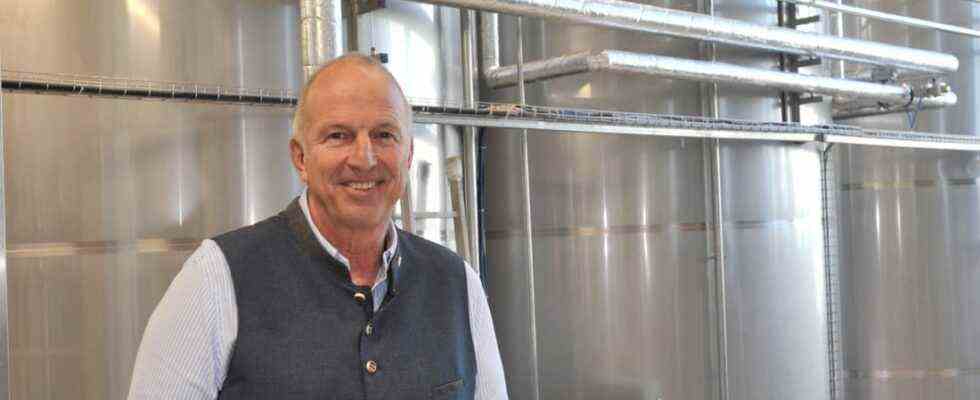The chairs in his meeting room were the last thing delivered. He saw and bought them from a fairly well-known chain of furniture stores. A bargain, he reveals: “I’m a bargain hunter”. That says Florian Schuh, a 57-year-old man who has spent a lot of money in the past seven years. For example, for his “Starnberger Brauhaus” in Feldafinger’s Wieling industrial park: around ten million euros. And now, less than a year after it went into operation, the entrepreneur is again stretching out his fingers for a plot of land to build another brewery there: the post office in Starnberg’s Schorn industrial park. After all, after an area that, at more than 40,000 square meters, is twenty times the size of his current brewing site in Wieling.
This circumstance alone should give many an established brewery goosebumps. Because Schuh is actually a newcomer in the beverage world. So no one who appeared publicly as a beer producer in any form before 2015. He also admits this openly: “Yes, I’m a career changer.” But apparently one with success, if you look at the recent history of his “Starnberger Brauhaus”. In January 2015 he founded the Starnberger brewery, at that time still with Karl-Heinz Krawcyk, and wants to build on a brewery that existed in today’s district town until 1897. However, due to a lack of suitable land, he did not settle there, instead starting his beer production in Höhenrain in the municipality of Berg. The property is only rented, so Schuh is still looking for a plot of land for the new building of his brewery. He finally finds what he is looking for in Wieling. On a roughly 2,000 square meter site, he built a brewery with a production capacity of 80,000 hectoliters, ten times as much as he once produced in Höhenrain. “We could do even more in Wieling,” says Schuh. But only in theory: because improvements would then have to be made in terms of emission protection. Above all, Schuh would need more water. And he hasn’t.
The water pipe only has the diameter of an ordinary household pipe.
(Photo: Nila Thiel)
As proof of this statement, a shoe features one of the core pieces without which beer could never be brewed. The pipe through which one of the most important ingredients, the water, flows into his brewery. And this sight seems extremely strange even to a layman: the diameter of the good thing, i.e. the water connection, is similar to that to which private individuals attach their garden hose. The pipes behind, on the other hand, are of more corporate proportions with an estimated diameter of eight centimetres. “There’s no better way to document our problem,” says Schuh.
It was clear from the start that the amount of water in Wieling would not be too plentiful. “Only that in the end it would become less and less what matters to us, that doesn’t.” But Schuh says he had no choice but to set up his brewery there: the lease in Höhenrain expired due to the disputes with his former business partner, and no other plot of land than Wieling was available. However, he is currently in negotiations to perhaps get a little more water via a Tutzinger pipeline. “With the amount we have, we can only produce three days a week.”
Florian Schuh would like to build another brewery on the vacant post office site in Starnberg’s Schorn industrial estate.
(Photo: Nila Thiel)
Not enough for someone who has big plans – and has already bagged big things. He has an option for the site in Starnberg – “call it a return to the origins” – he is negotiating with the city about building rights. Schuh wants to keep the existing post office building and only in the rear part of the property a building permit for about 20 fermentation tanks with a height of 18 meters. The residents would benefit from his brewery – through less noise: “Beer trucks just drive less than postal trucks.” Appropriate reports and studies are in preparation.
And he wants to continue to grow if he gets the contract for Starnberg: in Wieling in future only his secondary varieties, i.e. wheat beer, Seenator and Spezial brauen, in Starnberg only light beer. In a significant amount. Initially, this should be aimed at 250,000 hectoliters per year, which will then be expanded to 500,000 hectoliters per year in the medium term – which will then definitely make it one of the larger breweries in Germany.
Florian Schuh cooperates in sales with the Krombacher brewery
But every investment also costs money, in this case a lot of money. How does a causally small brewer do that? To grow so much in just seven years? If you ask Schuh, a gentle smile plays on his lips: “You know, I’m quite fine. And so is the Schadeberger family.” The Schadeberger family owns the Krombacher brewery, one of the largest German beer producers. And through a management company, the family now holds ten percent of the shares in the Starnberger Brauhaus. Much more important for Schuh himself, however, is the sales cooperation that he has concluded with the Krombachers for northern Germany: “We don’t have such sales opportunities in terms of personnel,” says the Starnberg brewmaster. He was able to grow slowly as a result and, because he was able to concentrate on retail, also benefited during the pandemic: “From 2020 to 2021 we were able to generate more than 20 percent more sales.”
Against this background, it becomes clear that someone like Schuh could also manage a second brewery. Especially since Bavarian light beer is in vogue: nationwide, in the first ten months of last year alone, the industry recorded growth of almost 14 percent in this segment in retail. So Helles is the winner in the country. And the suffix Starnberg? Schuh also has a quick answer ready: “He’ll definitely contribute to that.”

